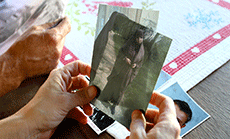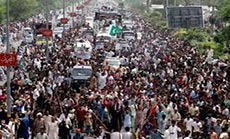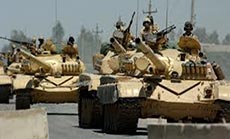
July War Cables— Seniora:”Israeli” Pushing Us into the Arms of Syria

LEBANESE PM SINIORA: "WE NEED HELP."
id: 71234
date: 7/13/2006 11:01
refid: 06BEIRUT2353
origin: Embassy Beirut
classification: SECRET
destination:
header:
VZCZCXRO7673
OO RUEHAG RUEHBC RUEHDE RUEHKUK
DE RUEHLB #2353/01 1941101
ZNY SSSSS ZZH
O 131101Z JUL 06
FM AMEMBASSY BEIRUT
TO RUEHC/SECSTATE WASHDC IMMEDIATE 4578
INFO RUEHEE/ARAB LEAGUE COLLECTIVE IMMEDIATE
RUCNMEM/EU MEMBER STATES COLLECTIVE IMMEDIATE
RHMFISS/COMSOCCENT MACDILL AFB FL IMMEDIATE
RHMFISS/CDR USCENTCOM MACDILL AFB FL IMMEDIATE
RHEHNSC/NSC WASHDC IMMEDIATE
----------------- header ends ----------------
S E C R E T SECTION 01 OF 02 BEIRUT 002353
SIPDIS
SIPDIS
NSC FOR ABRAMS/DORAN/SINGH/HARDING
E.O. 12958: DECL: 07/13/2016
TAGS: IS, IZ, LE, PGOV, PTER, SY
SUBJECT: MGLE01: LEBANESE PM SINIORA: "WE NEED HELP."
Classified By: Ambassador Jeffrey D. Feltman. Resaon: Sections 1.4 (b
) and (d)
SUMMARY
-------
1. (S) Lebanese Prime Minister Fouad Siniora expressed deep
concern to the Ambassador this morning that the current
security crisis is unfolding "as if by script," with Israel
and Hizballah dutifully playing out the assigned roles one
would expect in a worst case scenario path to regional war.
He argued that the only possible way to salvage the situation
will be for the GOL to "change the script" by dissociating
the GOL from Hizballah's actions, asserting the Lebanese
government's responsibility for security in the south,
maintaining peace along the Blue Line, respecting all
relevant international resolutions, and soliciting United
Nations support to negotiate a peaceful resolution to the
current crisis. Siniora also criticized Israel's military
response over the past 24 hours as "disproportionate" and
"unhelpful," and he requested USG and international
assistance in asking the Israelis to scale back their
military assault and lift the air and sea blockade of
Lebanon. Siniora argued that Israel's response plays into
the hands of Hizballah and Damascus and is paving the way for
a Syrian re-occupation of Lebanon. Siniora and the
Ambassador discussed international diplomatic initiatives to
resolve the crisis, including a German offer to serve as an
intermediary between Lebanon and Israel. Siniora also said
that a Presidential statement from the UNSC would be
beneficial -- even if critical of Lebanon -- and could
explore the possibility of using UNIFIL renewal as a tool to
reassert control in the south. The mood in the Grand Serail
was grim today, and as the meeting was breaking up, Siniora
leaned close to the Ambassador and flatly whispered, "We need
help." End Summary.
CONCERNED BY RAPID ESCALATION,
SINIORA SUGGESTS A STRONG GOL RESPONSE
--------------------------------------
2. (C) On the morning of July 13, the Ambassador and emboff
called on Prime Minister Siniora at the Grand Serail. The
British Ambassador to Lebanon, James Watt, was present in the
meeting as well. As the Prime Minister sat down, he
complained that Israel's strong military response has been
counterproductive and is uniting the Lebanese people behind
Hizballah. He then said he is planning a strong government
response of his own however, and had scheduled a Council of
Ministers meeting for that afternoon. In it, he said he
would push for a strong statement "dissociating" the GOL from
Hizballah's actions. Siniora also told the Ambassador that
the only way to "change the script" and take the initiative
away from Hizballah is to push for a unified GOL position
asserting the government's sole authority for security in
south Lebanon, calling for a cease-fire along the Blue Line,
respecting all relevant international resolutions, and
soliciting United Nations support to negotiate an immediate,
mutual cease-fire with Israel. The Ambassador asked the
Prime Minister if he had publicly made such a statement yet.
Siniora replied, "No, but I will." He added that he had made
a statement last night dissociating the government from
Hizballah's actions, but recognized that in the face of the
significant escalation from both sides that took place this
morning, he would need to take a stronger, more comprehensive
position.
3. (C) Siniora then returned again to the topic of Israel's
punishing military response this morning, and complained that
they were making the situation worse with "disproportionate"
actions that were uniting Arab opinion behind Hizballah and
against Israel. "They are crippling our economy, killing our
people, they are going to take us back twenty years. This
does not help." In response. the Ambassador suggested that
it would be important for the GOL to credibly distance itself
from Hizballah's assaults if they hoped to temper the
severity of Israel's retaliation.
A HIZBALLAH PROXY FOR THE
SYRIAN-IRANIAN ENDGAME
-------------------------
4. (C) The Prime Minister acknowledged as much, but said he
was concerned about Syria and Iran as well. The Prime
Minister's chief of staff, Ambassador Mohammad Chattah, said
that Hizballah's recent campaign was obviously conducted for
the benefit of Syria and Iran, "They want to distract
BEIRUT 00002353 002 OF 002
attention from the UNIIIC investigations and the nuclear
issue. That's the only explanation for why Hizballah would
do this after they've been assuring us they would be quiet."
The Prime Minister took it one step further, adding, 'They
knew what the result of this would be. They saw Gaza, they
knew how the Israelis would react. This isn't about trading
prisoners at all, even if that is the declared objective."
The Ambassador asked, in that case, what the Prime Minister
thought the Iranian - Syrian endgame is. Siniora sighed,
"They want to break our government and delay the tribunal,"
acknowledging that after crippling the Lebanese government,
Syria would then re-invade to "save" Lebanon from Israel. He
added that Iran also wants to open a front on Israel's
northern border to distract from the mounting tensions
regarding its own nuclear program.
ATTEMPTS AT RESOLUTION
----------------------
5. (C) Siniora thanked the Ambassador for the Secretary's
remarks yesterday, and said that he had also talked twice to
United Nations Secretary General Kofi Annan. He said that
Annan was considering sending an envoy to Lebanon to help
mediate the crisis. Siniora said he would prefer "someone
who understands the region," suggesting Terje Roed Larsen,
although he was aware that Annan is considering two other
candidates first. Siniora also said that he talked to
Egyptian President Hosni Mubarak and the Saudi government
yesterday as well, adding that Prince Saud gave strong
support by telling Siniora that they should not allow "any
organization (e.g. Hizballah) to undermine sovereign national
Arab security."
6. (S) Siniora also revealed an offer he said he had
received from Germany yesterday to serve as an intermediary
in negotiations between Lebanon and Israel. UK Ambassador
Watt said he thought it was a good idea, and that if the
Israelis were receptive, it would serve as useful and
discreet back channel. But, the UK Ambassador said, it is
far from clear that the Israelis are in any mood for such an
initiative. The Ambassador underscored the point, expressing
reservations. The Prime Minister's special assistant, Rola
Noureddine, pointed out that they would have to be careful in
setting up the back channel so that it doesn't look like they
are trying to negotiate a prisoner release, which would be
interpreted as a victory for Hizballah, or at least a GOL
endorsement of Hizballah's plan.
7. (C) Mohammad Chattah raised the possibility of a UN
Security Council Resolution (UNSCR) on the situation.
Ambassador Watt noted that any UNSCR would inevitably include
a condemnation Hizballah's actions as well. Prime Minister
Siniora responded by saying that at this point, a supportive
statement from the UNSC Presidency would be better than a
UNSCR. Siniora suggested that with UNIFIL renewal on the
table, perhaps the UNSC President could look at UNIFIL
renewal as a tool to reassert control in south Lebanon. Even
if the UNSC presidency statement would contain sharp
criticisms of Lebanon as well as calling for Israeli
restraint, Siniora said, he still thought action in New York
would be helpful.
HELP ON BLOCKADE
----------------
8. (C) Soon after the Ambassador left the meeting, Siniora
called by phone to say that he had forgotten to mention a key
point. Israel's announced air and sea blockade of Lebanon,
he said, was "pushing us all into the arms of Syria." "Syria
is becoming our lungs," he said; "we can only breathe through
the Syrians." He urged that the U.S. press the Israelis to
lift or at least lighten the blockade. He also passed on one
specific request: the Lebanese want to get six empty jets
(five belonging to MEA and a sixth) out of Beirut and to
Larnaca. Siniora expressed hope that the U.S. could at least
get the Israelis to allow the airport to function for 60-90
minutes to evacuate the planes. (Siniora claimed that the
runways could be temporarily patched quickly, in order to
allow the departure of the planes.)
FELTMAN
=======================CABLE ENDS============================
Source : Al Akhbar Newspaper
date: 7/13/2006 11:01
refid: 06BEIRUT2353
origin: Embassy Beirut
classification: SECRET
destination:
header:
VZCZCXRO7673
OO RUEHAG RUEHBC RUEHDE RUEHKUK
DE RUEHLB #2353/01 1941101
ZNY SSSSS ZZH
O 131101Z JUL 06
FM AMEMBASSY BEIRUT
TO RUEHC/SECSTATE WASHDC IMMEDIATE 4578
INFO RUEHEE/ARAB LEAGUE COLLECTIVE IMMEDIATE
RUCNMEM/EU MEMBER STATES COLLECTIVE IMMEDIATE
RHMFISS/COMSOCCENT MACDILL AFB FL IMMEDIATE
RHMFISS/CDR USCENTCOM MACDILL AFB FL IMMEDIATE
RHEHNSC/NSC WASHDC IMMEDIATE
----------------- header ends ----------------
S E C R E T SECTION 01 OF 02 BEIRUT 002353
SIPDIS
SIPDIS
NSC FOR ABRAMS/DORAN/SINGH/HARDING
E.O. 12958: DECL: 07/13/2016
TAGS: IS, IZ, LE, PGOV, PTER, SY
SUBJECT: MGLE01: LEBANESE PM SINIORA: "WE NEED HELP."
Classified By: Ambassador Jeffrey D. Feltman. Resaon: Sections 1.4 (b
) and (d)
SUMMARY
-------
1. (S) Lebanese Prime Minister Fouad Siniora expressed deep
concern to the Ambassador this morning that the current
security crisis is unfolding "as if by script," with Israel
and Hizballah dutifully playing out the assigned roles one
would expect in a worst case scenario path to regional war.
He argued that the only possible way to salvage the situation
will be for the GOL to "change the script" by dissociating
the GOL from Hizballah's actions, asserting the Lebanese
government's responsibility for security in the south,
maintaining peace along the Blue Line, respecting all
relevant international resolutions, and soliciting United
Nations support to negotiate a peaceful resolution to the
current crisis. Siniora also criticized Israel's military
response over the past 24 hours as "disproportionate" and
"unhelpful," and he requested USG and international
assistance in asking the Israelis to scale back their
military assault and lift the air and sea blockade of
Lebanon. Siniora argued that Israel's response plays into
the hands of Hizballah and Damascus and is paving the way for
a Syrian re-occupation of Lebanon. Siniora and the
Ambassador discussed international diplomatic initiatives to
resolve the crisis, including a German offer to serve as an
intermediary between Lebanon and Israel. Siniora also said
that a Presidential statement from the UNSC would be
beneficial -- even if critical of Lebanon -- and could
explore the possibility of using UNIFIL renewal as a tool to
reassert control in the south. The mood in the Grand Serail
was grim today, and as the meeting was breaking up, Siniora
leaned close to the Ambassador and flatly whispered, "We need
help." End Summary.
CONCERNED BY RAPID ESCALATION,
SINIORA SUGGESTS A STRONG GOL RESPONSE
--------------------------------------
2. (C) On the morning of July 13, the Ambassador and emboff
called on Prime Minister Siniora at the Grand Serail. The
British Ambassador to Lebanon, James Watt, was present in the
meeting as well. As the Prime Minister sat down, he
complained that Israel's strong military response has been
counterproductive and is uniting the Lebanese people behind
Hizballah. He then said he is planning a strong government
response of his own however, and had scheduled a Council of
Ministers meeting for that afternoon. In it, he said he
would push for a strong statement "dissociating" the GOL from
Hizballah's actions. Siniora also told the Ambassador that
the only way to "change the script" and take the initiative
away from Hizballah is to push for a unified GOL position
asserting the government's sole authority for security in
south Lebanon, calling for a cease-fire along the Blue Line,
respecting all relevant international resolutions, and
soliciting United Nations support to negotiate an immediate,
mutual cease-fire with Israel. The Ambassador asked the
Prime Minister if he had publicly made such a statement yet.
Siniora replied, "No, but I will." He added that he had made
a statement last night dissociating the government from
Hizballah's actions, but recognized that in the face of the
significant escalation from both sides that took place this
morning, he would need to take a stronger, more comprehensive
position.
3. (C) Siniora then returned again to the topic of Israel's
punishing military response this morning, and complained that
they were making the situation worse with "disproportionate"
actions that were uniting Arab opinion behind Hizballah and
against Israel. "They are crippling our economy, killing our
people, they are going to take us back twenty years. This
does not help." In response. the Ambassador suggested that
it would be important for the GOL to credibly distance itself
from Hizballah's assaults if they hoped to temper the
severity of Israel's retaliation.
A HIZBALLAH PROXY FOR THE
SYRIAN-IRANIAN ENDGAME
-------------------------
4. (C) The Prime Minister acknowledged as much, but said he
was concerned about Syria and Iran as well. The Prime
Minister's chief of staff, Ambassador Mohammad Chattah, said
that Hizballah's recent campaign was obviously conducted for
the benefit of Syria and Iran, "They want to distract
BEIRUT 00002353 002 OF 002
attention from the UNIIIC investigations and the nuclear
issue. That's the only explanation for why Hizballah would
do this after they've been assuring us they would be quiet."
The Prime Minister took it one step further, adding, 'They
knew what the result of this would be. They saw Gaza, they
knew how the Israelis would react. This isn't about trading
prisoners at all, even if that is the declared objective."
The Ambassador asked, in that case, what the Prime Minister
thought the Iranian - Syrian endgame is. Siniora sighed,
"They want to break our government and delay the tribunal,"
acknowledging that after crippling the Lebanese government,
Syria would then re-invade to "save" Lebanon from Israel. He
added that Iran also wants to open a front on Israel's
northern border to distract from the mounting tensions
regarding its own nuclear program.
ATTEMPTS AT RESOLUTION
----------------------
5. (C) Siniora thanked the Ambassador for the Secretary's
remarks yesterday, and said that he had also talked twice to
United Nations Secretary General Kofi Annan. He said that
Annan was considering sending an envoy to Lebanon to help
mediate the crisis. Siniora said he would prefer "someone
who understands the region," suggesting Terje Roed Larsen,
although he was aware that Annan is considering two other
candidates first. Siniora also said that he talked to
Egyptian President Hosni Mubarak and the Saudi government
yesterday as well, adding that Prince Saud gave strong
support by telling Siniora that they should not allow "any
organization (e.g. Hizballah) to undermine sovereign national
Arab security."
6. (S) Siniora also revealed an offer he said he had
received from Germany yesterday to serve as an intermediary
in negotiations between Lebanon and Israel. UK Ambassador
Watt said he thought it was a good idea, and that if the
Israelis were receptive, it would serve as useful and
discreet back channel. But, the UK Ambassador said, it is
far from clear that the Israelis are in any mood for such an
initiative. The Ambassador underscored the point, expressing
reservations. The Prime Minister's special assistant, Rola
Noureddine, pointed out that they would have to be careful in
setting up the back channel so that it doesn't look like they
are trying to negotiate a prisoner release, which would be
interpreted as a victory for Hizballah, or at least a GOL
endorsement of Hizballah's plan.
7. (C) Mohammad Chattah raised the possibility of a UN
Security Council Resolution (UNSCR) on the situation.
Ambassador Watt noted that any UNSCR would inevitably include
a condemnation Hizballah's actions as well. Prime Minister
Siniora responded by saying that at this point, a supportive
statement from the UNSC Presidency would be better than a
UNSCR. Siniora suggested that with UNIFIL renewal on the
table, perhaps the UNSC President could look at UNIFIL
renewal as a tool to reassert control in south Lebanon. Even
if the UNSC presidency statement would contain sharp
criticisms of Lebanon as well as calling for Israeli
restraint, Siniora said, he still thought action in New York
would be helpful.
HELP ON BLOCKADE
----------------
8. (C) Soon after the Ambassador left the meeting, Siniora
called by phone to say that he had forgotten to mention a key
point. Israel's announced air and sea blockade of Lebanon,
he said, was "pushing us all into the arms of Syria." "Syria
is becoming our lungs," he said; "we can only breathe through
the Syrians." He urged that the U.S. press the Israelis to
lift or at least lighten the blockade. He also passed on one
specific request: the Lebanese want to get six empty jets
(five belonging to MEA and a sixth) out of Beirut and to
Larnaca. Siniora expressed hope that the U.S. could at least
get the Israelis to allow the airport to function for 60-90
minutes to evacuate the planes. (Siniora claimed that the
runways could be temporarily patched quickly, in order to
allow the departure of the planes.)
FELTMAN
=======================CABLE ENDS============================
Source : Al Akhbar Newspaper
Comments

FBI: US Girls may Have Tried to join ’ISIL’
10 years ago

